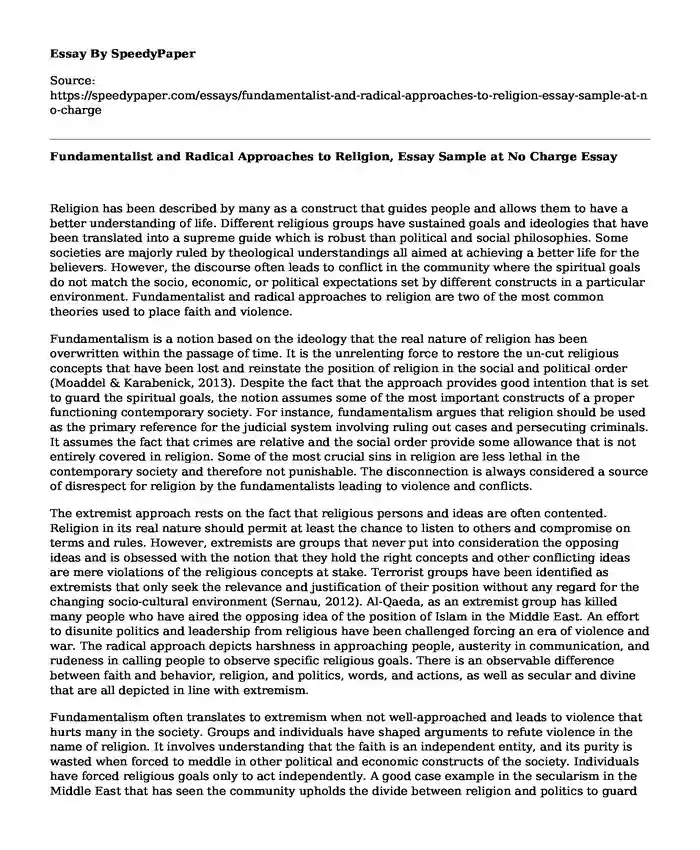Religion has been described by many as a construct that guides people and allows them to have a better understanding of life. Different religious groups have sustained goals and ideologies that have been translated into a supreme guide which is robust than political and social philosophies. Some societies are majorly ruled by theological understandings all aimed at achieving a better life for the believers. However, the discourse often leads to conflict in the community where the spiritual goals do not match the socio, economic, or political expectations set by different constructs in a particular environment. Fundamentalist and radical approaches to religion are two of the most common theories used to place faith and violence.
Fundamentalism is a notion based on the ideology that the real nature of religion has been overwritten within the passage of time. It is the unrelenting force to restore the un-cut religious concepts that have been lost and reinstate the position of religion in the social and political order (Moaddel & Karabenick, 2013). Despite the fact that the approach provides good intention that is set to guard the spiritual goals, the notion assumes some of the most important constructs of a proper functioning contemporary society. For instance, fundamentalism argues that religion should be used as the primary reference for the judicial system involving ruling out cases and persecuting criminals. It assumes the fact that crimes are relative and the social order provide some allowance that is not entirely covered in religion. Some of the most crucial sins in religion are less lethal in the contemporary society and therefore not punishable. The disconnection is always considered a source of disrespect for religion by the fundamentalists leading to violence and conflicts.
The extremist approach rests on the fact that religious persons and ideas are often contented. Religion in its real nature should permit at least the chance to listen to others and compromise on terms and rules. However, extremists are groups that never put into consideration the opposing ideas and is obsessed with the notion that they hold the right concepts and other conflicting ideas are mere violations of the religious concepts at stake. Terrorist groups have been identified as extremists that only seek the relevance and justification of their position without any regard for the changing socio-cultural environment (Sernau, 2012). Al-Qaeda, as an extremist group has killed many people who have aired the opposing idea of the position of Islam in the Middle East. An effort to disunite politics and leadership from religious have been challenged forcing an era of violence and war. The radical approach depicts harshness in approaching people, austerity in communication, and rudeness in calling people to observe specific religious goals. There is an observable difference between faith and behavior, religion, and politics, words, and actions, as well as secular and divine that are all depicted in line with extremism.
Fundamentalism often translates to extremism when not well-approached and leads to violence that hurts many in the society. Groups and individuals have shaped arguments to refute violence in the name of religion. It involves understanding that the faith is an independent entity, and its purity is wasted when forced to meddle in other political and economic constructs of the society. Individuals have forced religious goals only to act independently. A good case example in the secularism in the Middle East that has seen the community upholds the divide between religion and politics to guard the purity and sanity of religious ideas.
References
Moaddel, M., & Karabenick, S. A. (2013). Religious fundamentalism in the Middle East: A cross-national, inter-faith, and inter-ethnic analysis. Boston: Brill.
Sernau, S. (2012). Global problems: The search for equity, peace, and sustainability (3rd Ed.). Harlow, Essex: Pearson Education Limited.
Cite this page
Fundamentalist and Radical Approaches to Religion, Essay Sample at No Charge. (2022, Jun 06). Retrieved from https://speedypaper.com/essays/fundamentalist-and-radical-approaches-to-religion-essay-sample-at-no-charge
Request Removal
If you are the original author of this essay and no longer wish to have it published on the SpeedyPaper website, please click below to request its removal:
- Sociological Imagination Essay Samples
- Essay Example: My First Intimate Relationship as a Life-Changing Experience
- Free Essay on Pros and Cons of Combat Sports
- IRTPA Essay Sample for Your Inspiration
- MESPON 2018: Essay Example about the Conference
- Employee Diversity in School Psychology - Free Essay Sample
- Essay Sample on Political Meaning - The Mule
Popular categories





